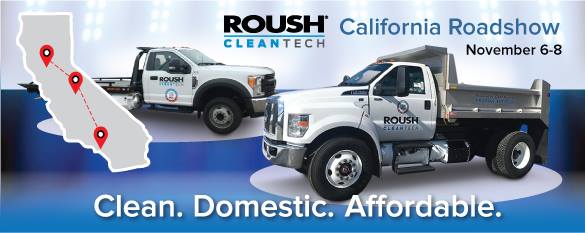Monday, November 19, 2018
(November 19, 2018) — The alternative fuel technology company ROUSH CleanTech (Livonia, Mich.) reports that its 0.02 grams per brake horsepower-hour engine can operate on renewable propane, making it the first available that produces near-zero emissions as defined by the California Air Resources Board. 
“When commercial vehicles are equipped with our ultralow-NOx engines and fueled by renewable propane they achieve near-zero emissions while still being financially viable for fleets,” said Todd Mouw, president of ROUSH CleanTech. “These clean-operating, medium-duty trucks, vans, and buses enable fleets to take a giant step toward meeting state clean-air standards, especially in California.”
Renewable propane is a non-fossil fuel that is produced from 100% renewable raw materials, including waste residue from sustainably produced vegetable oils. There is growing interest in renewable propane, also known as biopropane, due to its near-zero emission levels, reduced greenhouse gases, and ability to help meet growing demand for cleaner products. It can be used as a drop-in replacement fuel because it is chemically nearly identical to conventional propane.
Many companies in the U.S. and around the globe are developing renewable propane technology, with some production in commercial volumes result- ing as a byproduct of renewable diesel plant output. “Being relevant as an alternative fuel means constant innovation in technology for the equipment and the fuel,” said Tucker Perkins, president and CEO of the Propane Education & Research Council. “Renewable propane is just one example of that innovation, along with increasing engine efficiency and modern dispensers with near-zero emissions.”
ROUSH CleanTech unveiled the use of renewable propane during a three-city roadshow in California. The event also covered federal and state funding opportunities available for near-zero emission vehicles. “Because of their clean-burning properties, propane- fueled vehicles should be very competitive when it comes to seeking funding,” said Mouw. “In California alone, there are several grants, rebates, and incentives to help cover the costs of adopting emissions-reducing transportation technology.”
Earlier this year, ROUSH CleanTech received a California Air Resources Board certification for its ultralow-NOx 6.8-liter, V-10, three-valve propane engine for Class 4-7 vehicles. When fueled by traditional propane autogas, the engine is 90% cleaner than national emissions standards.
(Graphic Courtesy: ROUSH CleanTech)

“When commercial vehicles are equipped with our ultralow-NOx engines and fueled by renewable propane they achieve near-zero emissions while still being financially viable for fleets,” said Todd Mouw, president of ROUSH CleanTech. “These clean-operating, medium-duty trucks, vans, and buses enable fleets to take a giant step toward meeting state clean-air standards, especially in California.”
Renewable propane is a non-fossil fuel that is produced from 100% renewable raw materials, including waste residue from sustainably produced vegetable oils. There is growing interest in renewable propane, also known as biopropane, due to its near-zero emission levels, reduced greenhouse gases, and ability to help meet growing demand for cleaner products. It can be used as a drop-in replacement fuel because it is chemically nearly identical to conventional propane.
Many companies in the U.S. and around the globe are developing renewable propane technology, with some production in commercial volumes result- ing as a byproduct of renewable diesel plant output. “Being relevant as an alternative fuel means constant innovation in technology for the equipment and the fuel,” said Tucker Perkins, president and CEO of the Propane Education & Research Council. “Renewable propane is just one example of that innovation, along with increasing engine efficiency and modern dispensers with near-zero emissions.”
ROUSH CleanTech unveiled the use of renewable propane during a three-city roadshow in California. The event also covered federal and state funding opportunities available for near-zero emission vehicles. “Because of their clean-burning properties, propane- fueled vehicles should be very competitive when it comes to seeking funding,” said Mouw. “In California alone, there are several grants, rebates, and incentives to help cover the costs of adopting emissions-reducing transportation technology.”
Earlier this year, ROUSH CleanTech received a California Air Resources Board certification for its ultralow-NOx 6.8-liter, V-10, three-valve propane engine for Class 4-7 vehicles. When fueled by traditional propane autogas, the engine is 90% cleaner than national emissions standards.
(Graphic Courtesy: ROUSH CleanTech)

